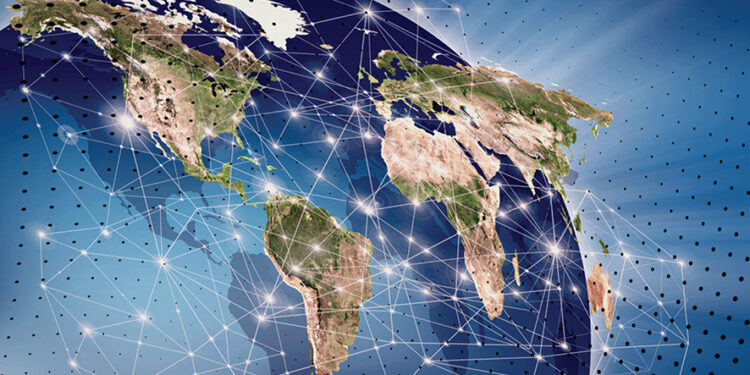The process of forming new spheres of influence is a multifaceted process. In addition to the general ‘framework’ handwriting, I will focus on several issues of the same process that – to varying degrees – will have their own and different impact:
The War in Ukraine
Despite the tragedy inherent in any war, not all wars produce the same political and military results. Against this background, system-building wars take on even greater significance.
The ongoing war in Ukraine, triggered by renewed Russian aggression, is precisely a system-building war. The formalisation of any of its outcomes will have a significant impact on the new global geopolitics as well as on the ‘unprincipled’ principles of the new, ‘disorderly’ order.
This war has already determined the following:
(a) The post-Cold War order is a thing of the past, and the war in Ukraine precludes even the theoretical possibility of a return to it;
(b) The use of force has become the norm, at least in the immediate and foreseeable future;
(c) The eastward expansion of the North Atlantic Alliance will not happen like the so-called ‘Big Bang’ and in an instant, as in the late 1990s and early 2000s; and this, in turn,
(d) Makes it relevant for security-vulnerable countries to work on other additional and complementary security compensation models in parallel with their Alliance membership. I have talked about compensation models many times in the past and will not dwell on the issue again now.
Despite the magnitude of the above circumstances, the war in Ukraine raises an equally important, and perhaps much larger, question: is the exchange or cession of territories an acceptable way to end hostilities and achieve a political settlement? Will the territorial deal be recognised as a novel legitimate means of modern diplomacy and political process?
The US and Trumpism
It is no accident that I have conflated these two, because United States policy, both domestic and foreign, is at this stage highly personalised and ‘free-floating’, not subject to the usual influence of institutions. I have recently devoted several extensive publications to characterising the current president and his administration, and virtually all of the views and observations expressed there are still valid.
The fact is that Trump’s departure from the traditional American policy framework has made the open declaration of benefits and their receipt in transactional form a cornerstone in the official US approach. It is also worth noting that the transformation of the national interests naturally characteristic of a superpower into egoistic ambitions has confused not only the American establishment, but also the entire world, and confronted it with a completely new dilemma. We have already talked a lot about it and will not repeat ourselves.
In practice, the political culture of Trumpism, in addition to other characteristics typical of the concept of “strongman”, radically changes the previously dominant understanding of the United States as a country of “leadership by example” and puts the main emphasis on the practical implementation of the principle of “might makes right”.
In addition, the above approach also interprets “conflict resolution” in a very peculiar way. In particular, according to the administration’s understanding, the resolution of a conflict (war) does not necessarily mean the restoration of a just status quo. Moreover, if realities require it, it is necessary to leave claims behind and “move forward”. Such “moving forward” may involve, among other things, operationalizing the territorial factor (including ceding or exchanging territory) to achieve a practical result – the resolution of a conflict or war.
In short, when it comes to the formation of a new order, the final contours of that order (or disorder) depend largely on the Trump administration, as does the answer to the following question: will the United States serve as a stabilizer or destabilizer of the new global relationship? The real content of both the new way of setting out spheres of influence and the Western “curatorial” sphere is also relevant to the same question. In turn, in terms of content, the key question is: will democracy continue to regress further or will it reverse?
There is no doubt that Trumpism has awakened us to a whole new world. However, I still believe that the battle between the two major schools of thought in the United States – restraint and engagement – is not yet definitively over. It is also a fact that if US global engagement is not equal in all places in the world and everywhere, it will occur differently depending on regions (so-called “geographies of primary and secondary interests”) and specific conjunctural interests. This would, of course, make Washington’s definition of spheres of influence more “utilitarian,” that is, more practical and applied. In turn, the “new reading” of the world by the United Sates through the prism of its own “national interests” makes Georgia also practically approach the projection of Georgian national interests, bringing them to the goal and achieving the desired and more tangible results.
The New European Union
In the context of Trump’s attitude towards Europe and the Russian military aggression in Ukraine, the European Union has been faced with a dilemma: finding itself in a way that does not damage its strategic alliance with the United States, while at the same time establishing itself as such a geopolitical player on the global map that is a force to be reckoned with against the backdrop of the Russian-Ukrainian war.
This task is not easy to accomplish, given the US willingness to give up the role of the EU’s “geopolitical babysitter” and the possible redistribution of spheres of influence in the US-Russia-China triangle. I doubt that in this case the EU will be able to realize a successful balancing (hedging) policy. As a result, it is deprived of a half-way choice, while the real choice is between a geopolitical actor with effective influence and a geographical agglomeration that means little.
This year is likely to be very telling in terms of how the European Union will manage to fully maintain its security umbrella from the United States on the one hand, and develop much-needed economic ties with China on the other. In addition, the European Union of new energy and attraction has another very delicate task to fulfill – not to be left out of the US-China relationship. To paraphrase a famous statement about Ukraine, the fundamental appeal of official Brussels would become the following: “Nothing about Europe without Europe”.
Still relevant Russia
In an order characterized as a “disorderly order,” Russia will continue to maintain its place. Obviously, unlike during the Cold War, Moscow, despite its stated desires, will find it difficult in practice to position itself as a global player. However, the “length and breadth” of such opportunities will again depend primarily on the strength and viability of the geopolitical and geo-economic unity between the United States and the West.
Among many other circumstances, the following reasons for the impossibility of “globalizing” Russia should be noted, namely: (a) Russia’s limited access to control over global supply routes, where such control is largely exercised by the US and China, and (b) Russia’s limited naval capabilities, which also hinder its global presence.
While assuming such a conventional attitude to globalism, I think we can speak much more convincingly about Russia’s strong regional influence. In this regard, the resilience and soundness of the Georgian political and defence system, based on the pooling and proper organisation of internal and external resources, do not bode well for our state’s complacency. We must adapt to this reality, tune in to it and adjust to its rhythm: as do the few countries that, by virtue of their history and geography, are forced to exist in a dangerous environment.
It is also worth remembering that in the 1960s of the previous century, the Soviet Union was called ‘Upper Volta with missiles’ in the Western media, and today the Russian Federation can be called by the same name. However, this name, in addition to its detrimental content, also carries real dangers.
The Middle Powers
I think it would be more correct to give this name to the countries of the so-called Middle Power category, which are acquiring their unique role through a process of ‘disorderly order’ in the newly formed system of relations.
To a large extent, they are still characterized by hedging policies. An example would be Kazakhstan, a country that is important for our country and Central Asia. Through its specific ‘open door’ policy, official Astana tries to maintain balanced relations with all actors with significant influence in the region. I think this is a really unique example, because in most cases countries with medium influence have to project their role by manoeuvring between the US (the ‘supplier’ of security) and China (the ‘supplier’ of material resources). It is clear that such manoeuvring is not an easy task against the background of the ongoing processes and requires filigree diplomatic and political techniques.
Among the countries in this category we can also distinguish countries with ‘medium plus’ influence. In fact, they can be called regional superpowers, since the formation of order in a particular region depends on their words and actions. In this regard, as an example, I will name Turkey for the Greater Black Sea region and Israel for the Middle East region. Both countries are system-forming actors of the respective regional order.
The Global South
In recent times, this designation has come into frequent use. Much has been said about the impact of the Global South, but in order to assess this impact, a few aspects should be briefly noted:
(a) There is a need to define a coherent and appropriate concept of the ‘Global South’. Today, there are many variants of its definition, and there is often a marked divergence between them;
(b) One very important issue must be defined: should the ‘Global South’ be understood with or without India and China? Obviously, the answer to this question provides two very different datums. In my opinion, it is logical to identify the Global South without China, as China has its own, unique and independent role in the international system. As for India, I think more thought is needed;
(c) Speaking of the Global South, I would also refer to the Greater Middle East region as a separate ‘center’. Such proposal is due to both historical, political and military factors characterizing it, which make it inappropriate to consider this region in conjunction with other countries or constituent regions of the Global South.
Towards the end with a Georgian point
Georgia’s attempts to strengthen its positioning in the current ‘disorderly order’ clearly have their limits. This is a limit that we cannot cross, because we will not be able to objectively influence the processes that create the system of the new order.
But this does not mean that we should stand aside and be content with a passive role. It is impossible to achieve the maximum in advocating national interests in the conditions of a dysfunctional state devoid of its own healthy geopolitical ego. The potential outcome is more deplorable when a country refuses to become a state and develop as a result of the known processes we see in its internal and external ‘business’ and, to say the least, ignorant policies.
In previous articles I have repeatedly touched upon the topic of Georgia’s security. The main line, to summarize, ran through the integral or broadly defined security system. This, along with the military component, equally includes economic self-sufficiency, proactive diplomacy, preventive special services, and using our country’s cultural wealth as a practical asset. National security modeling is a continuous and ongoing process, and its continuity lies precisely in the continuity and contradictory nature of global and regional processes.
The reality surrounding Georgia exacerbates the need for innovation, unconventionality and something completely new and progressive – dynamic, strategic and multi-dimensional thinking in our approach. Along with the ‘material’ components of national security (defence, economy, diplomacy), the viability of Georgian ‘soft power’, which is linked to democratic institutions, the rule of law, economic freedom and creative initiative in the country, is of paramount practical importance to us as a compact country. It is this ‘soft power’ that should be our calling card for asserting ourselves in the new order.
Understandably, it is difficult to make definite predictions about how to navigate this upside-down world. However, as Dwight Eisenhower once remarked, ‘Plans are useless, but planning is necessary’. It is time for us to move away from serving narrow partisan and syndicated interests, which amounts to the already mentioned ‘business-like’ behaviour, to creating a whole-of-government policy necessary for a self-respecting nation and country. This means, among other things, understanding the lessons not only of the recent past but also of our difficult present and drawing timely conclusions.
By Victor Kipiani, Chairperson of Geocase














